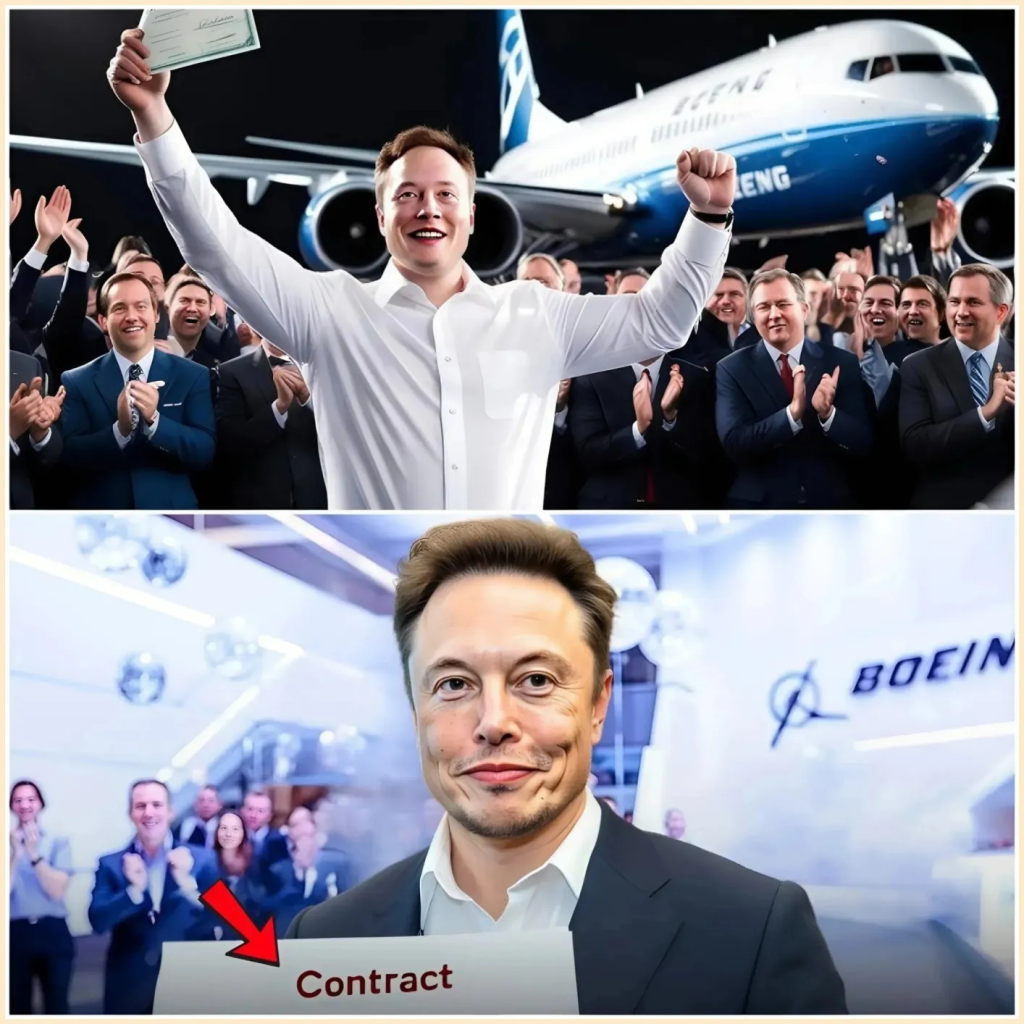In a bold and unprecedented move, Elon Musk has shaken the aerospace industry by announcing the acquisition of Boeing, one of the most iconic companies in the sector. This historic purchase has triggered global reactions, with both admiration and concern, as many believe this step solidifies Musk’s absolute dominance in the aerospace market.

A Landmark Deal That Reshapes the Industry
The announcement came via an official statement from SpaceX, Musk’s space exploration company, outlining the details of the multi-billion-dollar deal. While exact financial figures remain undisclosed, estimates suggest the acquisition exceeds hundreds of billions of dollars, making it one of the most costly and strategic purchases in modern history.
Financial markets reacted instantly, with Boeing shares skyrocketing following confirmation of the deal. Meanwhile, competitors such as Lockheed Martin and Northrop Grumman saw their stock prices plummet, as analysts suggest this acquisition places Musk in an almost unbeatable position.

Musk’s Growing Influence in the Aerospace Sector
For years, Elon Musk has been a driving force behind the transformation of the aerospace industry. Through SpaceX, he has revolutionized rocket launches, satellite deployment, and even laid out ambitious plans for Mars colonization. Now, with Boeing under his control, Musk secures a company that has dominated the aviation and aerospace sectors for over a century.
Boeing, known for its commercial aircraft, defense systems, and advanced aerospace technology, will now merge its expertise with SpaceX. The newly combined entity promises groundbreaking advancements in space travel, military technology, and commercial aviation.
Musk’s Vision for the Future
In his first public statement following the acquisition, Musk emphasized the importance of the deal:
“Boeing has been a pillar of aerospace innovation for generations. We are excited to merge its expertise with our mission to make space accessible to all. This is a crucial step for humanity’s future in space exploration.”
The announcement has sparked mixed reactions among industry experts and the public. Some view the acquisition as a game-changer that will accelerate innovation and competition. A Wall Street analyst commented:
“With Boeing’s resources and Musk’s disruptive mindset, we could be on the verge of a new era in space exploration and technological advancements.”
Concerns Over Monopoly and Market Control
However, not everyone shares the enthusiasm. Critics warn that Musk’s growing monopoly over key industries, including space exploration, electric vehicles, and artificial intelligence, could lead to an imbalance of power. A leading antitrust expert cautioned:
“With the Boeing acquisition, Musk now has unprecedented influence over the aerospace and defense industries. This could stifle competition and give him excessive control over the future of space technology.”
Governments worldwide have also expressed concerns about national security implications. Boeing has long been a key U.S. government contractor, and regulatory bodies are closely scrutinizing the deal. While Musk has assured compliance with all regulations and commitments to existing contracts, some lawmakers are calling for deeper investigations to safeguard national interests.
Impact on Boeing Employees and Future Plans
Boeing employees now face uncertainty over how the merger will impact jobs. While Musk has pledged to expand Boeing’s operations, fears of restructuring and potential layoffs persist.
Among Musk’s immediate plans is the launch of a joint program between SpaceX and Boeing to develop a next-generation fleet of commercial and space aircraft. Tentatively named “StarBoeing”, this initiative aims to create more efficient, sustainable, and safer transportation systems. Early prototypes are expected to be unveiled in the coming years.
Additionally, the merger will accelerate the expansion of Starlink, SpaceX’s global satellite internet service. By leveraging Boeing’s communications technology, Musk aims to fast-track high-speed internet accessibility in remote and underserved regions worldwide.
A New Era in Space Exploration
The impact of this acquisition will extend far beyond corporate strategy. With SpaceX and Boeing joining forces, the U.S. is set to strengthen its leadership in the global space race, positioning itself against rising competitors like China and Russia. Experts predict this merger could speed up plans for permanent bases on the Moon and Mars, as well as deeper exploration of distant planets and asteroids.
However, significant challenges lie ahead. Musk and his team will face regulatory, technical, and financial hurdles to successfully integrate two of the world’s largest aerospace companies. Meanwhile, rivals like Jeff Bezos’ Blue Origin and emerging space startups are preparing to counter Musk’s growing influence in the industry.
The Future of Aerospace Under Musk’s Leadership
Despite the obstacles, analysts agree that Musk’s acquisition of Boeing marks a pivotal moment in aerospace history. With his bold vision and track record of breaking barriers, Musk may be laying the groundwork for a future where space travel and technological innovation become an integral part of everyday life.
For now, the world watches closely as Elon Musk once again defies expectations and reshapes the boundaries of what is possible. With Boeing’s resources and SpaceX’s ambition, Musk’s dominance in the aerospace market appears unstoppable, ushering in a new era of space exploration and industry transformation.


